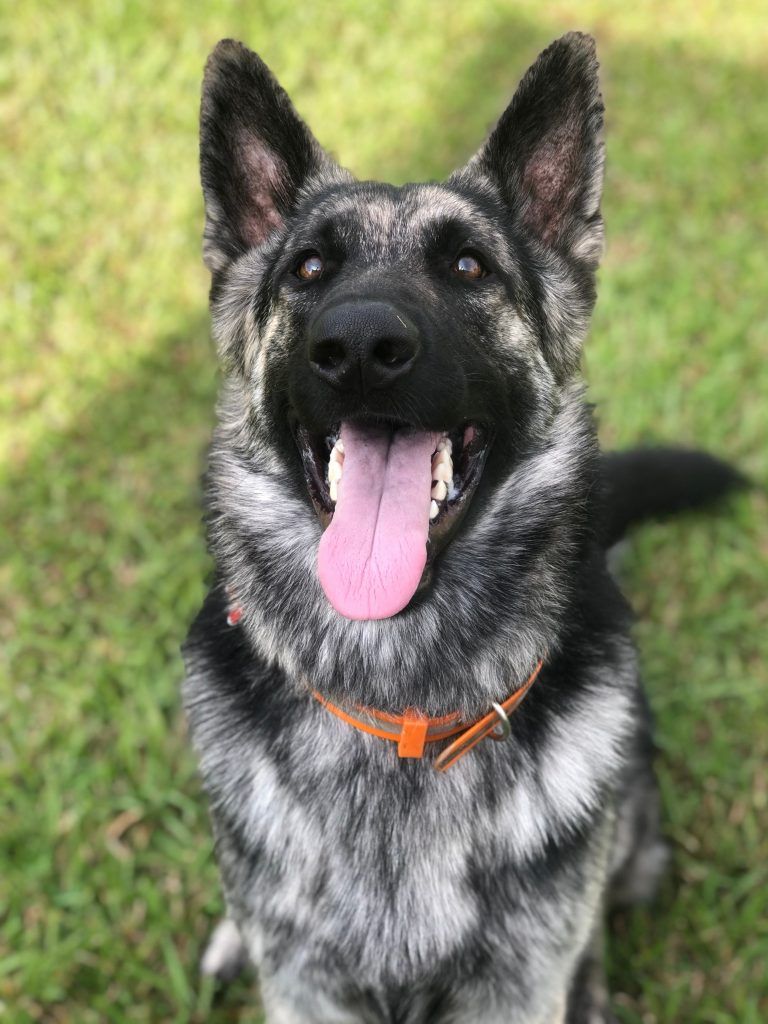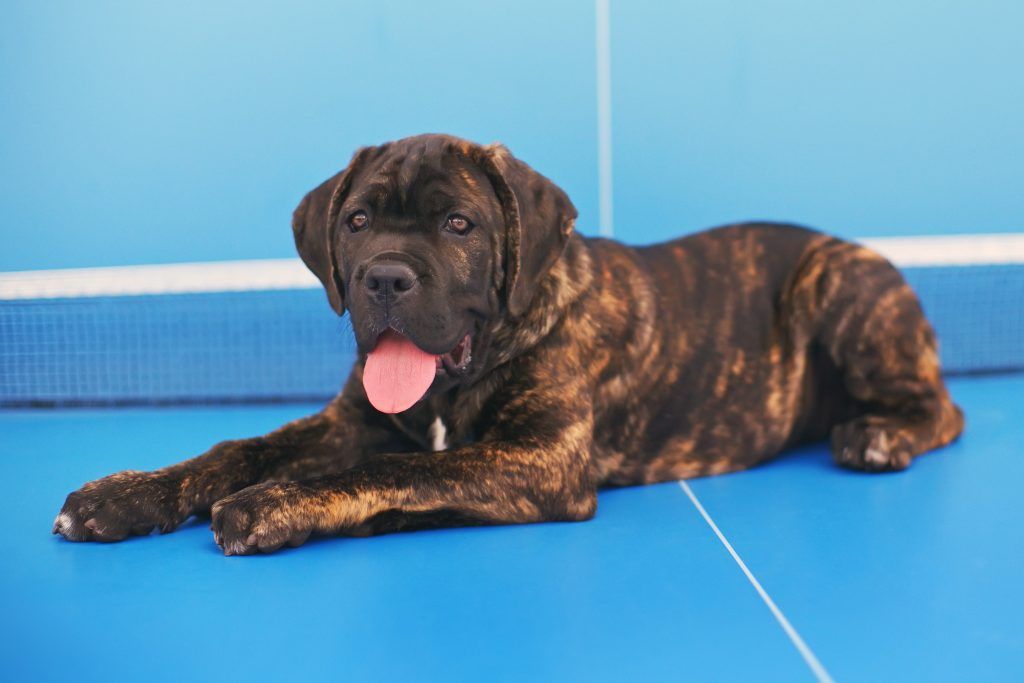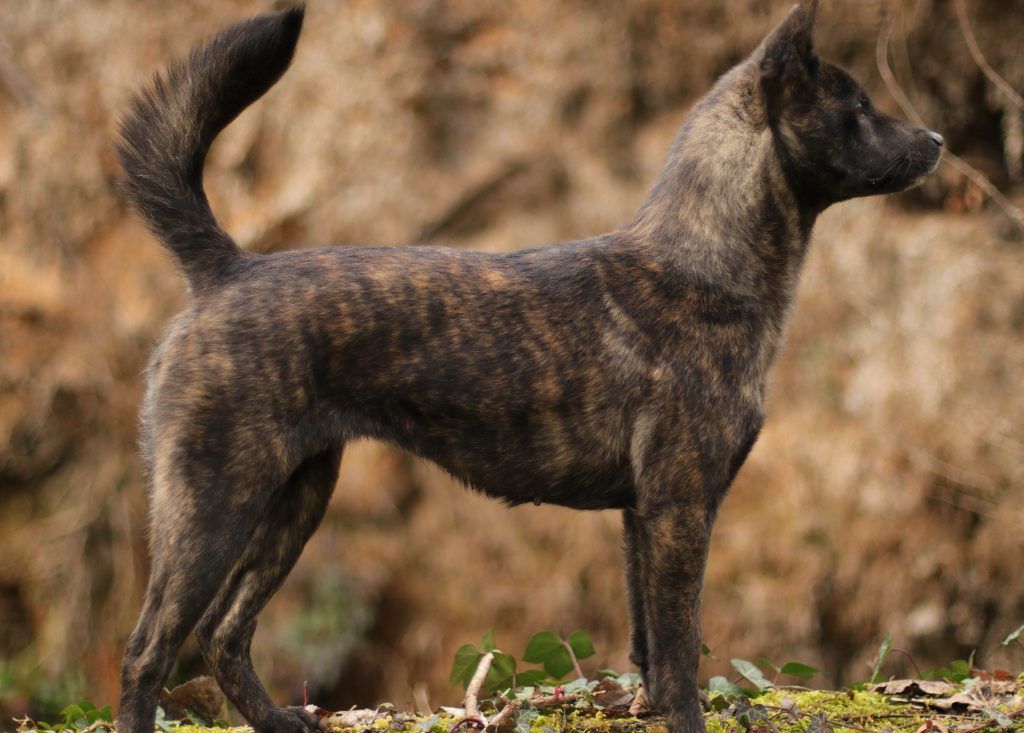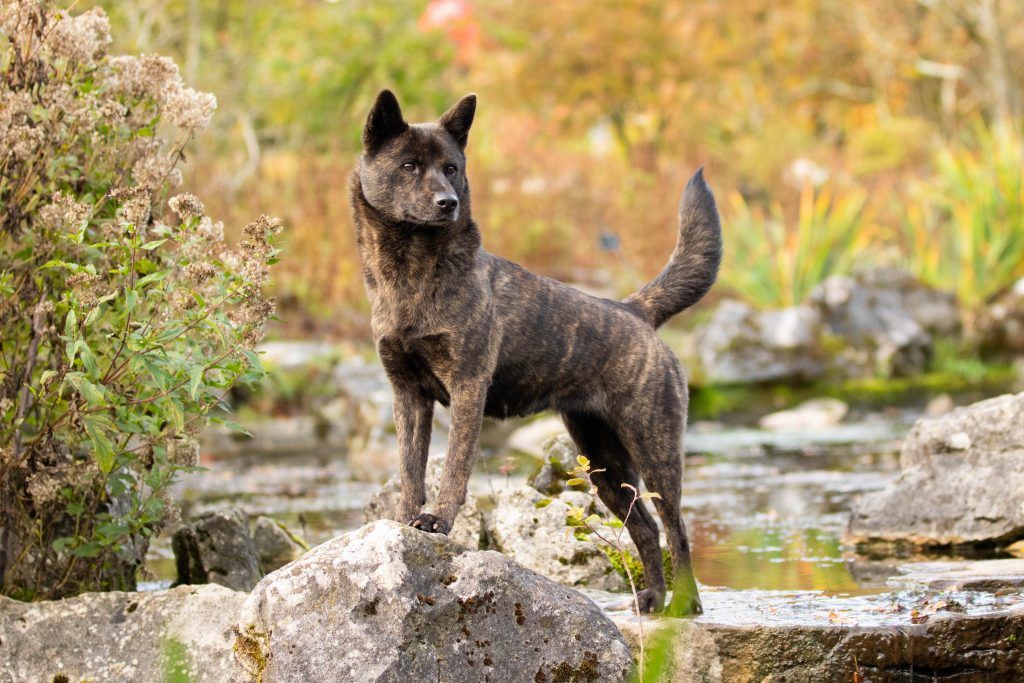Bring is a type of coat pattern dogs exhibit that features stripes of dark and light colors. Black stripes on a red base coat are common, but many other color combinations occur as well. Unfortunately, as incredible as the look can be, brindle dogs are not very popular among many dog owners and breeders. Public perception and myths that surround these dogs have further increased the unpopularity.
What is Brindle?
Brindle is a coat-coloring pattern seen in many animals, namely dogs, cows, guinea pigs, cats, and, occasionally, horses. The brindle pattern is frequently described as “tiger stripes,” although the brindle pattern is less dramatic than a real tiger’s. Brindle typically appears as black stripes on a red base. The stripes are eumelanin (black/brown pigment), and the base is phaeomelanin (red/yellow pigment), so the appearance of those pigments can be changed by any of the genes that affect them.
Aside from black and red, the most common colors are fawn, silver, brown, blue, and white. The extent of the brindled pattern, as I’m going to call it, can vary greatly as well. For example, some dogs can have so many black stripes that they look almost entirely black instead of resembling tiger stripes. These brindle dogs are typically referred to as reverse brindles.

Photo Credit: Shutterstock
Are Brindle Dogs More Aggressive?
One of the most common myths about brindle dogs is that they are more aggressive than other dogs. This is 100% wrong.
Brindle is just a coat color and has nothing to do with a dog’s personality or temperament. A dog’s behavior depends on many factors, such as breed, training, socialization, environment, health, and individual differences. There is no scientific evidence that links brindle to aggression or any other behavioral trait.
In fact, many brindle dog breeds are known for being friendly, loyal, playful, and intelligent. For example, boxers are one of the most popular brindle dog breeds in North America and are often described as “playful, charming, mischievous” by the AKC. Basenjis are another brindle dog breed that are typically loyal, calm, and gentle. Brindle dogs can make great family pets if they are well-trained and cared for.
Reasons Why Brindle Dogs Are Unpopular
Despite the fact that brindle dogs are not inherently aggressive or unhealthy, they still face some challenges in finding homes and acceptance. Here are some of the common reasons why brindle dogs are unpopular:
Public Perception (Association with Danger)
Nature has an incredibly beautiful way of using colors and patterns to show threats or danger. Many predators, like tigers, hyenas, and leopards, have contrasting patterns that people and other animals associate with danger. These patterns often evoke feelings of fear, anxiousness, or nervousness, which gives us our first reason people tend to steer clear of brindle dogs.
Similar to all black dogs, some people find them intimidating or threatening and often prefer dogs with lighter, more uniform colorations.
Myths about Health
Another reason why brindle dogs are unpopular is that there are some myths and misconceptions about their health. Some people may believe that brindle dogs are more prone to diseases or genetic defects than other dogs, which is also not true.
Brindle is just a coat color and has no negative impact on a dog’s health or lifespan. In fact, one study conducted on Cane Corso dogs found that, on average, the black brindle and brindle coated dogs lived over 2 years longer than their non-brindle counterparts.

Photo Credit: Shutterstock
It’s well known that certain breeds are more prone to health problems than other breeds, but the brindle coat doesn’t have any effect on this.
Difficult to Maintain Lineage
Another reason why brindle dogs are unpopular is that they are difficult to maintain in purebred lineages. This is because brindle is a recessive trait that requires both parents to carry the gene for it to be expressed. If one parent has a dominant coat color gene, such as black or fawn, the puppies will not be brindle. This means that breeders who want to produce brindle dogs have to carefully select their breeding pairs and test their genetic makeup.
Moreover, some breed standards do not accept brindle as a valid coat color or only allow it in certain variations. For example, the AKC does not recognize brindle as a standard color for poodles or golden retrievers. Some breeds, such as the Boston terrier, only allow brindle with white markings. This limits the options for breeders who want to produce brindle dogs and may also affect their popularity among buyers who prefer certain colors or patterns.
Bias Towards Brindle Dogs
Another reason why brindle dogs are unpopular is that they may face bias and discrimination from some people. This is especially true for shelter dogs, who are often overlooked or rejected by potential adopters based on their appearance. The RSPCA reported that brindle-coated dogs are in shelters 37% longer than other coat colors.
This bias may be influenced by the factors mentioned above, such as public perception, myths about health, and breed reputation. It may also be affected by personal preferences and tastes. Some people may simply not like the look of brindle dogs and prefer other colors or patterns.
Brindle and Dog Fighting
The last reason why brindle dogs are unpopular is that they are often associated with dog fighting. This is because some of the breeds that can have brindle coats are the most common breeds used for illegal dog-fighting activities. For example, pit bulls, mastiffs, cane corsos, and presa canarios are some of the breeds that are commonly exploited and abused for dog fighting.
The Brindle Gene
The brindle gene is a rare and naturally occurring recessive gene mutation of the black coat color gene. If one parent has a dominant black coat gene and the other parent is brindle and has the brindle gene, the puppies will be black because the brindle gene is recessive. However, if both parents are brindle or carry the brindle gene, some or all of the puppies will be brindle.
Brindle is technically a form of mosaicism, where some cells express one allele (KB) and other cells express a different allele (ky), a little like tortoiseshell cats. This makes it very difficult to test for, and there are currently no commercially available tests that are able to detect brindle. Brindle dogs will usually test as KBky, and carriers (one dominant black allele, one brindle) cannot be identified without breeding.

Photo Credit: Shutterstock
The brindle gene can also interact with other genes that affect the coat color and pattern. For example, if a dog has the merle gene, which causes patches of diluted pigment in the coat, it can create a brindle merle pattern. If a dog has the tan point gene, which causes tan markings on the face, chest, legs, and tail, it can create a black-and-tan or liver-and-tan pattern with brindle points.
The width and contrast of the stripes can vary depending on other genes that affect the amount and intensity of the pigments.
List of Dog Breeds That Can Be Brindle
Many different dog breeds can be born with brindle coats. In some of them, it’s a more common occurrence than others, but they all share this unique and beautiful trait. Here is a list of some of the dog breeds that can be brindle:
- Akita
- Anatolian Shepherd
- American Bulldog
- American Pit Bull Terrier
- American Staffordshire Terrier
- Basenji
- Basset Hound
- Boston Terrier
- Boxer
- Bull Terrier
- Bullmastiff
- Cane Corso
- Cardigan Welsh Corgi
- Catahoula Leopard Dog
- Dachshund
- Dutch Shepherd
- French Bulldog
- Great Dane
- Greyhound
- Irish Wolfhound
- Kai Ken
- Mastiff
- Plott Hound
- Presa Canario
- Rhodesian Ridgeback
- Scottish Deerhound
- Shiba Inu
- Staffordshire Bull Terrier
- Treeing Tennessee Brindle
- Whippet
These are just some of the breeds that can have the brindle gene. There are other breeds that have this coat pattern, particularly mixed breeds and mutts that we didn’t list. Brindle dogs come in all shapes and sizes, but they all have one thing in common: they are beautiful and unique.

Photo Credit: Shutterstock
Brindle dogs are not unpopular because they are bad or inferior. Quite the contrary, they are unpopular because of widespread myths and perceptions that have nothing to do with their true nature. Brindle dogs are just as loving, loyal, and adorable as any other dog.
If you are looking for a new furry friend, don’t overlook brindle dogs. They may surprise you with their charm and charisma. They may also teach you a valuable lesson: don’t judge a book by its cover or, more accurately, a dog by its coat.
























